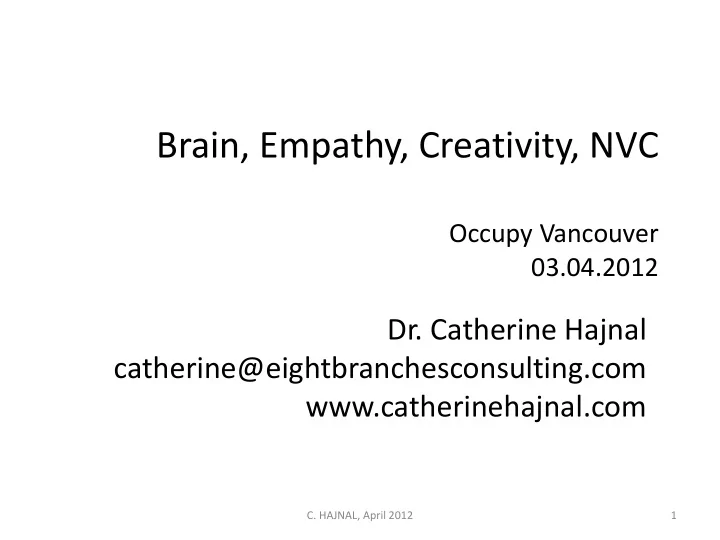

Brain, Empathy, Creativity, NVC Occupy Vancouver 03.04.2012 Dr. Catherine Hajnal catherine@eightbranchesconsulting.com www.catherinehajnal.com C. HAJNAL, April 2012 1
Brain, Empathy, Creativity, NVC • Your Brain – focus on Limbic System and PFC • What happens when we are “triggered” • Why that matters in the context of connection & conversation • What we can do about it – Play with NVC • Next steps – Does this relate to you and the work you are doing? C. HAJNAL, April 2012 2
Limbic System C. HAJNAL, April 2012 3 http://greatneck.k12.ny.us/gnps/shs/dept/science/krauz/bio_h/images/48_30LimbicSystem_L.jpg
C. HAJNAL, April 2012 4 Thank you to Sarah Peyton for the image. www.empathybrain.com
PFC – Prefrontal Cortex Left Prefrontal Cortex Right Prefrontal Cortex (to do lists, executive function) (compassionate self witness, sense of self) Left Amygdala Right Amygdala (threats we know about, irritants, (our intensity, passion, chaos, rage, annoyances, small griefs and losses) terror, grief, suffering, shame, humiliation) Our Hippocampi file and track our factual and autobiographical memories until they have migrated to the cortex. C. HAJNAL, April 2012 5 Thank you to Sarah Peyton for the image. www.empathybrain.com
Triggered / Threats / Noise • Constantly on the look out for threats • Bad is stronger than good (threat reward) • “Your ideas are crazy.” – as activating to your brain as a physical threat • Activation of limbic system influences deactivation of PFC • Little bit of threat creates lots of noise in the brain – insight does not happen when our brain is noisy – impact on problem solving/creativity • Regulation – a key to controlling “noise” C. HAJNAL, April 2012 6
Social Issues Are Primary • • Primary needs (food, shelter, water) Status yes AND • Certainty • Autonomy • For your brain, social needs are • Relatedness primary • Fairness • Any perceived loss of connection is a • All use the primary reward and threat social pain that activates the same circuitry. regions of the brain as physical pain. • e.g. A perceived change in status • We come out of the womb looking downward is considered a threat. for wired for and dependent on (Our status change might influence connection. our connecting.) • Don’t collaborate well with people who you think are foes. C. HAJNAL, April 2012 7
What can we do with this? • Regulate emotions: – Expression • Helpful but can be maladaptive depending on the context – Suppression • Limbic system stays as aroused or gets worse, memory gets worse – Cognitive Change • Less arousal, no change in memory • Requires very thing we’re losing fast when aroused - PFC C. HAJNAL, April 2012 8
Cognitive Change Strategies • Labeling – Define an emotional state in a word or two • Reappraisal – Reframing/recontextualizing – Changing the entire interpretation of an event • The more you understand your brain, the more you can reappraise. C. HAJNAL, April 2012 9
How NVC can help (Non-Violent Communication) • Labeling – Get in your body – Have the words to use (feelings) • Reappraisal – What’s behind the “story”? (needs) – Self-Empathy • What applies to you, applies to the person you are looking at too – What are they experiencing? – Empathy for others C. HAJNAL, April 2012 10
“Listening” • “ Empathy is a respectful understanding of what others are experiencing. Often, instead of offering empathy, we have a strong urge to give advice or reassurance and to explain our own position or feeling. Empathy, however, calls upon us to empty our mind and listen to others with our whole being .” - Marshall B. Rosenberg • Empathy “Are you feeling anxious because you are needing clarity around the next steps? • Advising “I think you should…” “Why don’t you….” • One-upping “That’s nothing, listen to what happened to me!” • Educating “If you looked at the situation this way…..” • Consoling “I know you are doing the best you can.” • Story-telling “That reminds me of the project last year when we…” • Sympathizing “Oh, you poor thing!” • Explaining “The reason the project is taking so long is because…” • Correcting “You haven’t spent 5 weeks on that project!” • Interrogating “Why did you say you’d do it? What….;When…;Where…. “How come you didn’t__________” • Changing the Topic “Let’s go shopping.” C. HAJNAL, April 2012 11
My thanks to… • Dan Siegel • David Rock • Sarah Peyton • Marshall Rosenberg • …for their body of work that has contributed to my understanding and evolution. • For links to my favourite resources of theirs see: – http://www.catherinehajnal.com/favorites/brain/ – http://www.catherinehajnal.com/favorites/people-books/ C. HAJNAL, April 2012 12
Recommend
More recommend